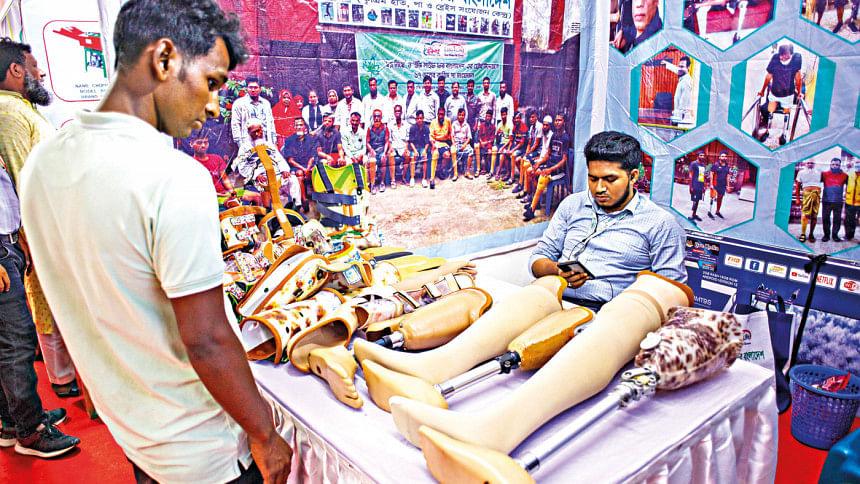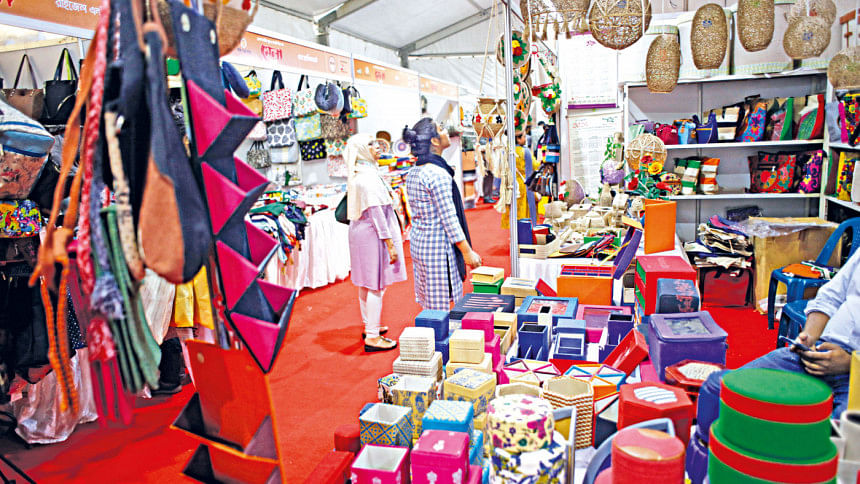Challenges abound for aspiring entrepreneurs

Ashit Chowdhury, managing director of AAPON, a manufacturer of shataranji and various jute home decor products, applied for a loan of Tk 30 lakh from a private commercial bank.
However, he found out in early May that the interest rate rose before the loan was approved. Therefore, he chose not to go ahead with the borrowing plan.
"Previously, I could secure a loan at a 4 percent interest rate. Now it has escalated to 13.50 percent. Consequently, the business is not maintaining its usual cash flow. This will negatively impact the business in the future," he said.

Chowdhury, who launched his business in 2019 with an investment of about Tk 11 lakh, has made big strides in the past six years. Now, his business portfolio has ballooned to Tk 55 lakh and he runs two factories, located in Rangpur and Nilphamari, alongside two showrooms.
Annually, he sells products worth approximately Tk 1.5 crore.
Speaking to The Daily Star at the 11th National Small and Medium Industrial Products Fair in Dhaka, Chowdhury said another major factor hindering the growth of his company was the hike in prices of raw materials.
Raw material prices rose 10 percent in the past year, but instead of passing on the full cost to customers and possibly hampering sales, he increased prices by 5 to 7 percent. This calculated risk reduced his profit margin.
"In the last fiscal year, we managed to raise the workers' salaries by only about 3 percent because income and expenditure were not balanced. However, in July, we plan to increase it by 10 percent," he said.
Small and medium enterprises (SMEs) are the backbone of Bangladesh's economy, but entrepreneurs like Chowdhury are facing myriad challenges.
Many SMEs are struggling due to a lack of access to finance. This is one of the biggest obstacles for SMEs, especially as it prevents companies from setting up shops or scaling up existing operations.
Md Masudur Rahman, chairperson of the SME Foundation, said there is a Tk 25,000 crore revolving fund for the SME sector at the Bangladesh Bank, but it is only one-third of the total requirement.
Furthermore, marginalised entrepreneurs who cannot provide evidence of financial transactions cannot avail loans from the formal sector, he said. "So, they borrow from the informal sector, which charges more. This increases the cost of production."
The chairperson said the state-run agency is working with banks and entrepreneurs to devise a mechanism to ensure access to finance for all entrepreneurs.
Additionally, SMEs also contend with a lack of marketing, shortage of skilled manpower, poor training facilities, undeveloped sales channels, and low levels of financial inclusion.
Kaniz Fatema, a leather goods and footwear manufacturer, thinks the primary challenge is the shortage of skilled workers.
According to the entrepreneur, being a woman meant that she had to face and overcome various social challenges when it came to running business. She, however, added that the full support of her family helped her persevere.
She said the price of raw materials rose by 10 to 15 percent over the past year, squeezing the profit margin. She chose not to increase prices at the same rate to maintain sales, even if it meant lower profits.
Her business, providing only men's footwear, was established in 2019 at an initial investment of Tk 10 lakh. The total investment has since grown to Tk 50 lakh as she has diversified her range of products into 150 different categories.
In the past, Fatema only supplied products to wholesale traders and a few brands, but now she is focusing on e-commerce and also has a showroom in the capital's New Market.
Anjuman Akter, a business partner of Tulika, a jute product manufacturer, said their company outsourced their production to other factories in 2009. However, the factory that received their order failed to meet their specifications, resulting in a loss of Tk 50,000.
"Every problem gives us the courage to take on new challenges," she said.


 For all latest news, follow The Daily Star's Google News channel.
For all latest news, follow The Daily Star's Google News channel. 



Comments